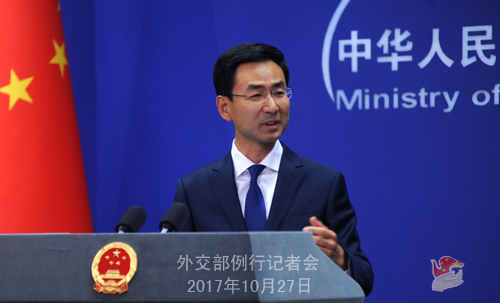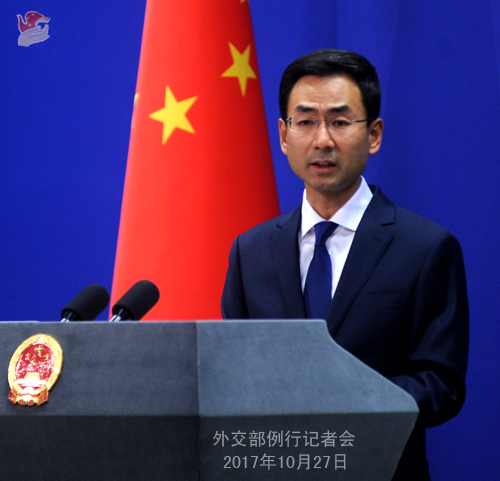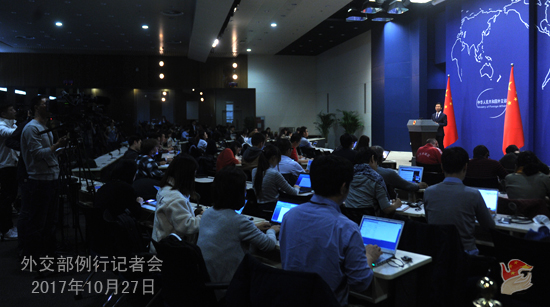| Foreign Ministry Spokesperson Geng Shuang's Regular Press Conference on October 27, 2017 |
| 2017-10-27 21:10 |
|
Q: The 23rd Winter Olympics will be held in Pyeongchang, the Republic of Korea (ROK) in February, 2018. As the 24th Winter Olympics is going to take place in Beijing, the participation of Chinese leaders in the Winter Olympics in Pyeongchang is something to look forward to. What is your comment on that? Second, the ROK President Moon Jae-in sent a congratulatory message to Mr. Xi Jinping on his reelection as General Secretary of the Central Committee of the Communist Party of China (CPC), saying that he hopes to meet with President Xi Jinping as soon as possible. How do you comment on that? A: I will answer your second question first. Indeed, we have received President Moon Jae-in's congratulatory message to General Secretary Xi Jinping, the information of which has been released. I have no information to share with respect to the meeting between the two heads of state. We hope the two sides will jointly work to bring the bilateral relations back to the track of sound and steady development at an early date. Regarding your question of whether the Chinese leaders will participate in the Pyeongchang Winter Olympics, the Chinese side remains open to the exchanges and cooperation between China and the ROK in various fields, including those in culture and people-to-people exchanges. We hope to work with the ROK to create enabling conditions and necessary atmosphere for such cooperation and exchanges. Q: Tsai Ing-wen will be visiting three of Taiwan's allies in the Pacific from tomorrow, during which she will transit via Hawaii and Guam. Has China expressed any concerns or lodged any representations with the United States about these transits? A: The one-China principle is a consensus widely shared by the international community and the principle we have always upheld in handling Taiwan's external exchanges. On your question about the "transit" of the leader of the Taiwan region, the true purpose of her so-called "transit" is self-evident. We hope the US will abide by the one-China policy and the principles of the three China-US joint communiques, deny her "transit", refrain from sending any wrong message to the Taiwan independence forces and uphold the larger interests of China-US relations and cross-straits peace and stability. The Chinese side has lodged stern representations with the US side on this matter.
Q: President Donald Trump on Thursday declared the opioid epidemic in the US a public health emergency. In particular, he mentioned cutting off the supply of fentanyl analogues from China, adding that he would raise this issue as a top priority to President Xi Jinping in his visit to China and expect relevant measures to be taken by China. How do you respond to that? A: I believe you may have noted that on October 4, the first China-US Law Enforcement and Cybersecurity Dialogue (LECD) was held in Washington D.C., during which the two sides achieved important outcomes in strengthening anti-drug cooperation. Recently, the two sides have jointly cracked a case of transnational drug crime. As I understand, as agreed by the two sides previously, the China-US meeting on anti-drug cooperation will be held in Beijing on October 30 and 31, and the two sides will look into the projects for deepening cooperation in the anti-drug area. The Chinese government attaches great importance to the international joint management of the drug issue. As a highly responsible country, China has listed and regulated up to 23 kinds of fentanyl analogues though there is no abuse of fentanyl analogues in China yet, and some of them are even beyond what is included in the list of controlled in UN conventions. Meanwhile, the Chinese government actively cooperate with the US and other countries within the framework of the UN Convention Against Illicit Traffic In Narcotic Drugs And Psychotropic Substances and China's law. At the 60th Session of the UN Commission on Narcotic Drugs (CND) in March, the Chinese side agreed to include two fentanyl precursors, namely ANPP and NPP, into the listing and regulation under international conventions. At present, we are conducting our regulatory work on these two substances in accordance with domestic procedures. Q: First, the US Treasury Department announced further sanctions on the DPRK, adding 7 individuals and 3 entities of the DPRK to the sanction list, including the DPRK's Consul-General in Shenyang. Has China communicated with the US about this? Will the DPRK's Consul-General in Shenyang be expelled? Second, is Assistant Foreign Minister Kong Xuanyou visiting Japan from today to October 29? Will the China-Japan-ROK leaders' meeting and the Korean Peninsula issue come up in the discussions during his visit? A: As to your first question, we have noted the relevant reports. Our stance is very clear. The Chinese side has always disapproved of any unilateral sanctions outside the framework of the UN Security Council imposed on others by a certain country in accordance with its domestic law. In response to your second question, I can confirm to you that Assistant Foreign Minister Kong Xuanyou traveled to Japan on October 27 for the China-Japan security dialogue and will exchange views on bilateral relations and other issues with the Japanese side. Q: The chief of the DPRK foreign ministry's US department Choe Son-Hui is now in Beijing. Do you have any comment on this? Is there any plan for official meetings? A: I'm not aware of what you said. Q: Do I understand you correctly that, your answer to the question about the DPRK Consul-General in Shenyang means that the Consul-General will stay in Shenyang despite the State Department and the Treasury Department's statements and the comment by the State Department yesterday that this matter has been raised with China? A: I would like to reiterate that the Chinese side has always followed through on the Security Council's DPRK-related resolutions in a comprehensive, accurate, faithful and strict manner. Meanwhile, we will maintain normal exchanges and cooperation with the DPRK on the basis of abiding by the Security Council resolutions Q: Recently, the Secretary-General of the United Nations Antonio Guterres submitted to the Security Council a report on the issue of Somali piracy, which mentions a couple times that China's escort mission in the Gulf of Aden and waters off the coast of Somalia has played an important role addressing the threats from pirates. What's your comment on this? A: In December 2008, the Chinese navy sent the first fleet to the Gulf of Aden and waters off the coast of Somalia for escort mission under the UN's mandate. As of July 2017, the Chinese navy has dispatched 26 escort task force convoys that have escorted more than 6400 ships, warned away over 3000 suspected pirate ships and effectively safeguarded the security of important sea lanes of international trade. China's participation in the global cooperation to fight Somali pirates has been commended by the relevant countries. It has made an important contribution to upholding international and regional peace and security and showcased China's image as a responsible major country. We appreciate the appraisal of China's work and contributions in this report of the UN Secretary-General. As General Secretary Xi Jinping pointed out in his report to the 19th National Congress of the Communist Party of China (CPC), China will follow its foreign policy's purpose of safeguarding world peace and promoting common development and always be the builder of world peace, contributor to global development and defender of international order. The Chinese side will continue to actively participate in the escort missions in the Gulf of Aden and waters off the coast of Somalia, expand international escort cooperation, fulfill its international responsibility and obligation, and play a bigger role in upholding international and regional peace and stability and safeguarding the security of important international routes. Q: You said China maintains normal exchanges with the DPRK. So what will China do to ensure that it doesn't launch another missile or nuclear test? A: China stays committed to realizing the denuclearization of the Korean Peninsula, upholding peace and stability of the Peninsula and resolving the Korean Peninsula nuclear issue through dialogue and negotiation. You must be clear about this position, so are the international community and the DPRK. Q: The United Nations investigators said yesterday that Bashar al-Alsad's regime was responsible for the chemical attack which happens earlier within this year in the north of Syria. Does China have any comment? A: China's position on the issue of chemical weapon remains clear-cut and consistent. We hope the conclusion of any investigation should be grounded on solid and reliable evidence, conforms to the principle of professionalism, objectiveness and justice and will stand the test of history.
|
 |
|


